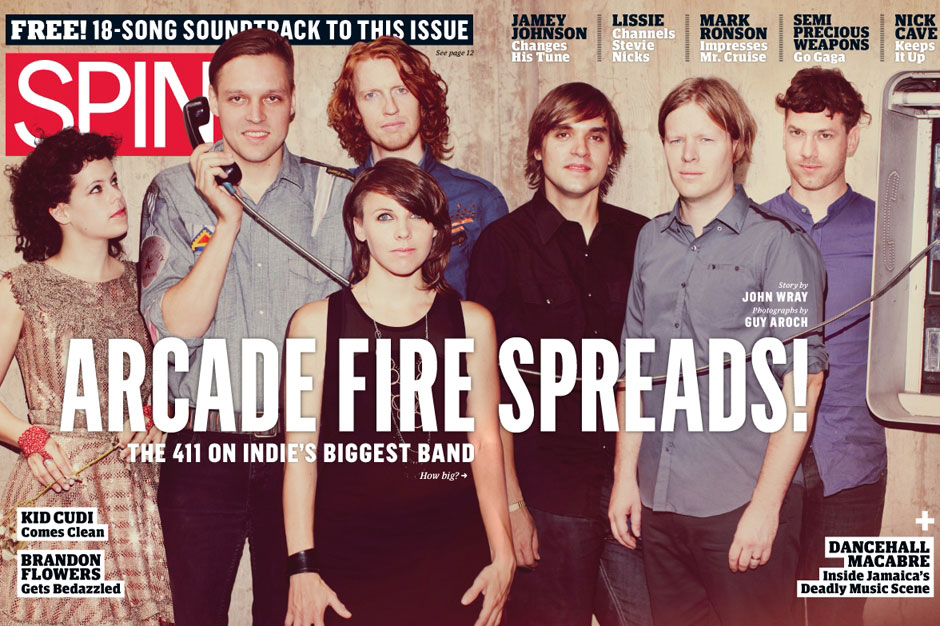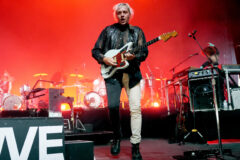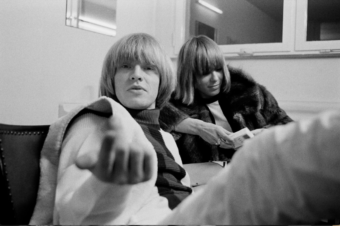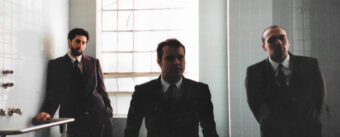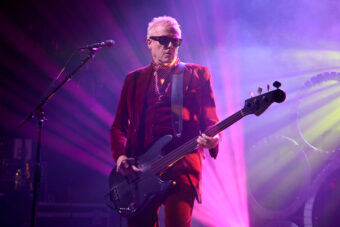No. 1 albums, sold-out arenas, total and complete comfort with the trappings and demands of mainstream success — what kind of indie band is this? John Wray hits the road with Arcade Fire and learns the answer: an indie band like no other. [Magazine Excerpt]
Respect for the Game
It’s 5:45 on a flawless summer afternoon at Montreal’s Osheaga Music Festival, just under three hours before Arcade Fire are scheduled to play in front of a capacity crowd of over 50,000 — by far their biggest ever show in their hometown — but the gig is the last thing on anyone’s mind. A more epic reckoning is at hand: a table-tennis throwdown with Pavement.
“I sent an e-mail to [Pavement’s] Bob Nastanovich, saying I’d heard they were the best on the circuit,” Jeremy Gara, Arcade Fire’s drummer-shouter-guitarist, tells me. “He wrote me back a two-line answer: ‘Pavement thanks you for your gracious invitation. Your ass is grass.’?”
As he says this, Gara’s eyes widen slightly, and he looks, even more than usual, like a mischievous and slightly startled little boy. “I hear [Stephen] Malkmus is good,” he tells Tim Kingsbury, Arcade Fire’s guitarist-bassist-keyboardist. (Note: Elaborate hyphenates are unavoidable when identifying the seven, at least, members of Arcade Fire.) Kingsbury nods his mop-topped head serenely.
“Win’s good, too,” Kingsbury, 33, says of his own band’s singer-guitarist-bassist-keyboardist, Win Butler. “And he doesn’t like to lose.”
A small crowd starts to gather around the blue table. “I don’t even play Ping-Pong,” Gara, 32, murmurs. “What in God’s name have I started?”
The men of Pavement arrive a few minutes later, dressed in polo shirts and shorts and tennis shoes, appearing in the ring of catering trailers with a certain low-key dignity, as befits their status as elder statesmen of the indie grind. (Not that the setup in Osheaga feels “indie,” if that word has any currency left these days: Guitar techs, personal assistants, photographers, photographer’s assistants, security, on-call masseuses, and God knows what else swarm around like so many aphids, and the food — always the best barometer of a festival’s fiscal health — ranges from smoothies to jerk Alaskan king crab. There’s an oyster bar, for Christ’s sake. Did I mention the on-call masseuses?) Nastanovich, Pavement’s tom-slapper, screamer, and all-purpose mascot, claims rustiness, then trounces Kingsbury, 36–15. Pavement guitarist Scott Kannberg and drummer Steve West opt out of the fray, leaving Malkmus and Win Butler, who’ve seemed a bit shy around each other so far, to get on with the afternoon’s marquee event. As they step to the table, Butler tells Malkmus that he really enjoyed a show Pavement put on more than ten years ago. Malkmus shrugs affably. And so it begins.
For all that Malkmus and Butler have in common — white boys from cushy backgrounds who front indie-rock outfits with rabid followings — they couldn’t seem more different from one another. Malkmus is a patrician and preppy well-to-do dad on vacation, while Butler, 30, with his vaguely paramilitary outfit and his lanky jock’s body topped by a sandy brown quasi-mohawk, looks like Steve Nash channeling Joe Strummer. For a backstage hangout, especially one centered on a competitive sporting event, things feel pleasantly hierarchy-free, but even Arcade Fire’s well-known commitment to collectivity has its limits. During a pause in the Butler-Malkmus face-off, two friends of the band tie up the table for a little too long. “C’mon, guys,” Butler mutters impatiently. “Show a little respect for the game.”
Butler and Malkmus resume their play with studied nonchalance, but the match is fast and fierce and nearly silent. Heckling is kept to a respectful minimum as members of the National rank among the looky-loos. The score, after two games, is a perfect draw: 21–16, 16–21. Butler wants to go best out of three, but there’s the little matter of the aforementioned 50,000 fans, so the gentlemen of Pavement climb into a convoy of chauffeured golf carts and putter smoothly off into the sunset. I ask Gara if it feels as though a torch of some kind has been passed. Being a well-mannered young man (and a Canadian, to boot), he actually considers this question.
“I dunno,” he says. “If Win had won, maybe?”
Three Hours Later
I’m standing on the right side of Osheaga’s enormous main stage, observing a large crowd in the process of having their brains defibrillated. Subtlety is the first casualty of the festival circuit, and — although precise, painstaking details abound on all Arcade Fire recordings, including their third album, The Suburbs, which will be released three days from now — the band’s live incarnation has all the nuance of a North Korean air show. At no point does any member of the band seem anything less than ecstatic: Richard Reed Parry and Will Butler, Win’s younger brother, and Régine Chassagne, his wife, dash from one side of the stage to the other, switching from guitar to drums to keys to instruments I barely know the name of, sometimes mid-song; Kingsbury and Sarah Neufeld, on violin, thrash and sway and shudder gracefully; Gara bashes at the kit with his eyes and mouth wide open; and at the center of all this expertly stage-managed hysteria, Win lurches around like a heartbroken Frankenstein’s monster. In the brief snatch of silence after “Month of May,” The Suburbs’ most blistering number, a starstruck hipster behind me turns to his googly-eyed girlfriend. “They’re, like, six or seven bands all packed together,” he murmurs.
“Yeah,” says the girlfriend. “Inside of an aircraft carrier.”
A lot of great bands — even some Arcade Fire owe a debt to — have built whole careers on self-doubt; not Win Butler and family. If one quality seems indivisible from the music they make, from their eponymous 2003 EP up to and including The Suburbs, it’s conviction. Unabashable, indefatigable, Sherman’s-March-through-Georgia righteousness, a blitzkrieg on apathy of every possible stripe comes across as clearly as a five-bell alarm on the band’s recordings, but at their concerts it hits you physically, in your muscles and your rib cage and your intestines — everywhere — before your brain has had a chance to arm itself. The Suburbs’ eighth track, “Half Light II (No Celebration),” makes this transaction plain: “Wanna wash away my sins / In the presence of my friends.” If there’s a more clear-cut summary of arena-rock catharsis than those two simple lines, I haven’t come across it yet.

